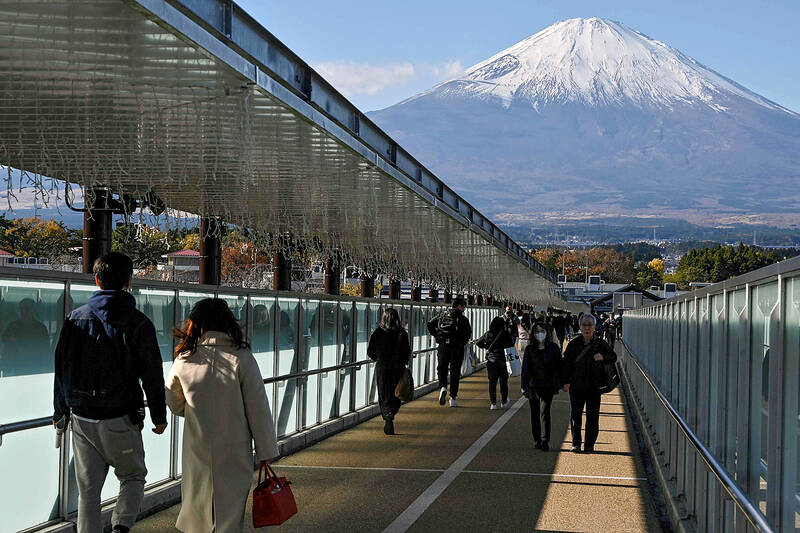Unfounded online rumors warning that a huge earthquake would soon strike Japan are taking a toll on travel firms and airlines who report less demand from worried Hong Kongers.
People from Hong Kong made nearly 2.7 million trips to Japan last year.
Although it is impossible to know exactly when earthquakes will hit, fear-inducing predictions have spread widely among the territory’s residents.

Photo: AFP
Some of the false posts cite a Japanese manga comic, republished in 2021, that predicts a major natural disaster in July this year — based on the author’s dream.
Other posts give different dates, while a Facebook group that claims to predict disasters in Japan has more than 250,000 members, mainly in Taiwan and Hong Kong.
“The earthquake prophecy has absolutely caused a big change to our customers’ preferences,” said Frankie Chow (周錦基), head of Hong Kong travel agency CLS Holiday.
Chow said that in March and last month, his firm received 70 to 80 percent fewer inquiries about traveling to Japan than last year.
“I’ve never experienced this before,” said Chow, who also runs the Flyagain.la booking Web site.
While some people changed their destination, others “did not dare to travel,” he said.
Mild to moderate earthquakes are common in Japan, where strict building codes minimize damage, even from larger shakes, but the nation is no stranger to major disasters, including in 2011 when a magnitude 9.0 quake triggered a tsunami that left 18,500 people dead or missing and caused a meltdown at the Fukushima Dai-ichi nuclear power plant.
Earthquakes are rarely felt in Hong Kong, but some people are easily spooked by disinformation, Chow said.
Last month, Tokyo’s Cabinet Office wrote on X that “predicting earthquakes by date, time and place is not possible based on current scientific knowledge.”
A Cabinet Office official told reporters that the X post was part of its usual information-sharing about earthquakes.
However, Japan’s Asahi Shimbun reported that it was responding to prophecies that sprung up online after a Japanese government panel in January released a new estimate for the probability of a “megaquake.”
The panel said the chance of a massive earthquake along the undersea Nankai Trough south of Japan in the next three decades had marginally increased to 75 to 82 percent.
This was followed by a new damage estimate in March from the Cabinet Office, which said a Nankai Trough megaquake and tsunami could cause 298,000 deaths in Japan.
Despite being a routine update of a previous 2014 figure, the estimate appears to have fanned tourists’ fears.
A YouTube video featuring a feng shui (風水) master urging viewers not to visit Japan, published by local media outlet HK01, had been viewed more than 100,000 times.
Don Hon, one of Hong Kong’s 7.5 million residents, does not entirely believe the online claims, but has still been influenced by them.
“I will just take it as a precaution, and won’t make any particular plans to travel to Japan,” the 32-year-old social worker said.
If a friend were to ask him to visit Japan in July, Hon “might suggest going somewhere else.”

AloJapan.com